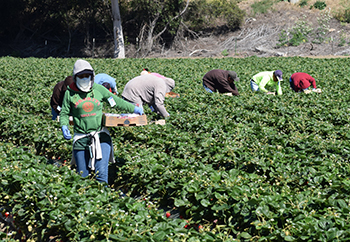Four UC Davis research centers will share a $3.7 million grant to offer free COVID-19 testing for agricultural workers in the Central Valley, where the coronavirus pandemic has reached alarming levels, the National Institutes of Health (NIH) announced Wednesday.
 Farmworkers in four counties will benefit from free COVID-19 testing
Farmworkers in four counties will benefit from free COVID-19 testing
The funding for the UC Davis Environmental Health Sciences Center, Clinical and Translational Science Center (CTSC), Center for Reducing Health Disparities and Comprehensive Cancer Center is part of a national strategy to improve COVID-19 testing for underserved and vulnerable populations.
In all, the NIH is providing $234 million to improve the health of populations disproportionately affected by the pandemic.
"It is critical that all Americans have access to rapid, accurate diagnostics for COVID-19, especially underserved and vulnerable populations who are bearing the brunt of this disease," said NIH Director Francis S. Collins.
Under the initiative, UC Davis will send two mobile health vans to offer rapid antigen testing at locations convenient for the workers and their families. The university will hire a clinical coordinator and lab tech for each van, and work side-by-side with community partners who have longstanding relationships with farmworker groups.
UC Davis is one of only 32 institutions to receive funding from the federal government's Rapid Acceleration of Diagnostics (RADx) initiative and the RADx Underserved Populations (RADx-UP) program.
Locally, the project is called ÓRALE COVID-19: Organizaciones para Reducir, Avanzar y Lograr Equidad contra el COVID-19 (Organizations to Reduce, and to Advance, and Lead for Equity against COVID-19). In Spanish, órale is slang for affirmation about something positive such as "OK," or "right on."
Serving an at-risk population for COVID-19
California's hundreds of thousands of farm workers, the vast majority of whom are Latino and considered essential workers, are among the state's highest risk populations for COVID-19 infections and complications.
The grant allows UC Davis to connect with community partners to test workers in Fresno, Madera, Stanislaus and Yolo counties, which have higher confirmed COVID-19 cases than the state overall. The project is a natural fit for UC Davis, which strives to serve underserved populations across the region.
"This is a great opportunity to really provide tangible support to the communities in the Central Valley," said Irva Hertz-Picciotto, director of the Environmental Health Sciences Center. "It's clear that the epidemic is in many ways out of control in this region."
Latinos make up about 40 percent of California's population, but more than 60 percent of its COVID-19 cases, according to the state Department of Public Health. Latinos die of COVID-19 at a rate nearly twice as high as whites.
Nearly four out of every five people, aged 35-49, who die of COVID-19 in California are Latino.
Many Latinos are employed as essential workers, including farmworkers, and are more likely to contract and spread COVID-19.
Farmworkers often lack personal protective equipment (PPE) and are unable to stay 6-feet from co-workers, especially when traveling to work in employer buses and vans. They are more likely to have higher rates of underlying health conditions such as diabetes and obesity and live in crowded homes where the virus can spread rapidly. Many farmworkers can't afford to miss work, even if they're sick, and are less likely to take time off the job to go to a COVID-19 testing site, said Sergio Aguilar-Gaxiola, the director of the UC Davis Center for Reducing Health Disparities.
"We are taking the ÓRALE COVID-19 project where the needs are, and the needs right now, based on the data in terms of the number of cases, the number of deaths, the spread, the outbreaks that are happening, is in the Central Valley and other agricultural areas," said Aguilar-Gaxiola.
He said partnerships in the community-driven project will be key to the initiative's success.
"These trusted community based organizations have such a long track record of working with farmworkers, and therefore are the community experts; we can't do this project without them," added Aguilar-Gaxiola, who is also director of the community engagement program of the CTSC.
Ted Wun, associate dean for research at the UC Davis School of Medicine, who is also principal investigator of the CTSC, said the project aligns perfectly with his center's goals of partnering with communities in every phase of translational research and fully engaging underserved populations.
And on a more personal note, he added, "As a native of the Central Valley, I am especially gratified we will be working to lessen the terrible impact COVID-19 has had on our regional neighbors."
Reliance on community partnerships
The community partners involved in the initiative are Radio Bilingue, Central California Environmental Justice Network, Lideres Campesinas, California Rural Legal Assistance Foundation, West Modesto Community Collaborative, Centro Binacional para el Desarollo Indigena Oaxaqueño, Building Healthy Communities-Fresno, the Health Education Council, the General Consulate of Mexico in Sacramento, and Rise Inc.
"This is an excellent opportunity to work hand-in-hand, on equal terms, with the community organizations that work with Latino farmworkers," said Professor Luis Carvajal-Carmona of the UC Davis Department of Biochemistry and Molecular Medicine.
Carvajal-Carmona is also affiliated with the Comprehensive Cancer Center where he leads the Latinos United for Cancer Health Advancement (LUCHA) initiative.
"This is a unique opportunity for UC Davis to strengthen its mission and help the community," added Carvajal-Carmona, who is also co-director of community engagement at the CTSC.
The COVID-19 testing is expected to begin in a couple of months.
The grant is being made possible by the National Institute of Environmental Health Sciences of the National Institutes of Health under Award Number P30ES023513.






